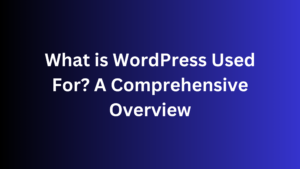WordPress powers over 40% of all websites on the Internet,
making it one of the world’s most popular content management systems (CMS).
However, choosing the best WordPress hosting provider is crucial to getting the most out of your WordPress site.
The hosting you select can significantly impact your site’s speed, security, and overall performance.
In this article, we’ll explore WordPress hosting in-depth, helping you understand your options and choose the best one for your needs.
Types of Best WordPress Hosting Providers
Shared WordPress Hosting
Shared hosting is the most affordable option, making it popular for beginners and small websites.
With shared hosting, multiple websites share the same server resources,
which helps keep costs low. However, other sites on the same server can affect your website’s performance.
Managed WordPress Hosting
Managed hosting is like having your personal WordPress concierge.
With this type of hosting, the provider takes care of all the technical aspects, such as updates, security, and backups, allowing you to focus on creating content and growing your site.
While managed hosting is more expensive than shared hosting, it’s ideal for those who want a hassle-free experience.
VPS WordPress Hosting
VPS (Virtual Private Server) hosting offers a middle ground between shared and dedicated hosting.
Your site is still hosted on a shared server, but it’s partitioned so that you have dedicated resources.
This setup provides better performance and more control compared to shared hosting.
Dedicated WordPress Hosting
Dedicated hosting means that your website has an entire server to itself.
This option offers the best performance, security, and control but comes at a premium price.
Dedicated hosting is typically used by large websites with high traffic volumes or those requiring specific server configurations.
Cloud WordPress Hosting
Cloud hosting is a relatively new option that uses multiple servers to host your website.
This setup allows for greater scalability and redundancy, as your site can tap into resources from several servers.
If one server goes down, another can take its place, ensuring your site remains online. Cloud hosting is ideal for websites that experience fluctuating traffic.
Key Features to Look for in WordPress Hosting Providers
Speed and Performance
Website speed is crucial for user experience and SEO.
To ensure your site runs smoothly, look for hosting providers that offer fast loading times, optimized servers, and caching solutions.
Security Features
Your website’s security should be a top priority.
Choose a hosting provider with robust security features, including SSL certificates,
malware scanning, and firewalls. Regular backups are also essential to restore your site in case of any issues.
Customer Support
Reliable customer support can be a lifesaver when you encounter issues with your hosting.
Opt for providers that offer 24/7 support via multiple channels, such as live chat, email, and phone.
Scalability
As your website grows, so will your hosting needs.
It is essential to choose a provider that can scale with you. This provider should offer easy upgrades to higher-tier plans or additional resources as required.
Pricing and Value for Money
While choosing the cheapest option is tempting, it’s essential to consider what you’re getting for your money.
Look for hosting plans with the best features, performance, and support within your budget.
Top WordPress Hosting Providers
Bluehost
Features

WordPress officially recommends Bluehost, and for a good reason.
They offer various hosting plans tailored for WordPress users, including shared, VPS, and managed hosting.
Bluehost is known for its user-friendly interface, making it easy for beginners to get started.
Pros and Cons
Pros:
- Affordable pricing
- Free domain name for the first year
- 24/7 customer support
Cons:
- Upselling during the signup process
- Limited advanced features in lower-tier plans
- The integration option is paid
SiteGround
Features

SiteGround is another hosting provider WordPress recommends.
They offer fast and secure hosting solutions and focus on customer support.
SiteGround’s managed WordPress hosting includes automatic updates, daily backups, and advanced security features.
Pros and Cons
Pros:
- Excellent customer support
- Free daily backups
- High performance and speed
Cons:
- Higher renewal rates
- Limited storage on lower-tier plans
WP Engine
Features

WP Engine is a premium managed WordPress hosting provider known for its high performance and reliability.
It offers a range of features tailored to WordPress, including automatic updates,
staging environments, and top-notch security.
Pros and Cons
Pros:
- Exceptional speed and performance
- Advanced security features
- Developer-friendly tools
Cons:
- Expensive compared to other providers
- Limited storage on entry-level plans
Kinsta
Features

Kinsta is a managed WordPress hosting provider built on the Google Cloud Platform.
They focus on delivering high-performance hosting with a strong emphasis on security and scalability.
Kinsta’s dashboard is user-friendly and packed with powerful features.
Pros and Cons
Pros:
- Built on Google Cloud for superior performance
- Automatic daily backups
- Easy-to-use dashboard
Cons:
- Premium pricing
- No email hosting
DreamHost
Features

DreamHost is a versatile hosting provider offering shared and managed WordPress hosting.
It is known for its commitment to privacy and transparency.
DreamHost’s plans include unlimited bandwidth, free SSL certificates, and a 100% uptime guarantee.
Pros and Cons
Pros:
- Affordable pricing
- Unlimited bandwidth
- 100% uptime guarantee
Cons:
- Limited customer support options
- No free email hosting on basic plans
How to Choose the Best WordPress Hosting for Your Needs
Assessing Your Website’s Requirements
Before selecting a hosting provider, evaluating your website’s specific needs is essential.
Consider factors such as expected traffic, site complexity, and any required features.
Comparing Hosting Plans
Once you’ve identified your requirements, compare hosting plans from different providers.
Look at what each plan offers regarding features, performance, and pricing.
Remember to consider renewal rates. Some providers offer attractive introductory prices that increase significantly upon renewal.
Evaluating User Reviews and Expert Opinions
User reviews and expert opinions can provide valuable insights into hosting providers’ performance and reliability.
Look for reviews that discuss aspects such as uptime, customer support, and ease of use.
Be cautious of overly positive or negative reviews, as they may not always reflect the experience.
Considering Future Growth
When choosing a hosting provider, thinking about the future is essential.
Consider how easy it is to upgrade your plan or add additional resources as your website grows.
A provider that offers scalable solutions will save you time and money in the long run.
Common Mistakes to Avoid When Choosing WordPress Hosting
Ignoring Security Features
One of the biggest mistakes you can make when choosing a hosting provider is ignoring security features. Your website’s security should be a top priority,
so make sure your hosting plan includes essential security measures such as SSL certificates, firewalls, and malware protection.
Overlooking Customer Support
Customer support is crucial, especially if you’re new to WordPress or web hosting.
Make sure your hosting provider offers reliable, 24/7 support through multiple channels.
Avoid providers that only provide limited support options or charge extra for assistance.
Choosing Based on Price Alone
While staying within your budget is essential,
choosing a hosting provider based solely on price can lead to disappointment.
Cheaper hosting plans often have limitations in features,
performance, and support. Investing more in a plan that meets your needs and offers good value for money is better.
Failing to Plan for Scalability
As your website grows, your hosting needs will change.
Failing to plan for scalability can lead to performance issues and downtime.
Choose a hosting provider that offers easy upgrades and additional resources to accommodate your website’s growth.
Conclusion
Choosing the best WordPress hosting for your website is a critical decision that can significantly impact its performance, security, and success.
By understanding the different types of hosting available and considering key features such as speed, security, and customer support, you can make an informed choice that meets your needs.
To ensure your website thrives, remember to assess its requirements, compare hosting plans, and plan for future growth.
FAQs
What is the difference between shared and managed WordPress hosting?
Shared hosting is a more affordable option where your website shares server resources with other sites, while managed WordPress hosting offers a more hands-off experience, with the provider taking care of updates, security, and backups.
How much should I expect to pay for WordPress hosting?
The cost of WordPress hosting can vary widely depending on the type of hosting and the provider you choose. Shared hosting plans can start as low as a few dollars per month, while managed hosting can cost upwards of $30 per month.
Can I switch hosting providers later?
Yes, you can switch hosting providers later. Many providers offer migration services to help you transfer your site to a new host without downtime.
Is WordPress hosting necessary for a small website?
While WordPress-specific hosting is not strictly necessary for a small website, it can offer benefits such as optimized performance, enhanced security, and easier management.
How do I migrate my WordPress site to a new host?
Migrating your WordPress site to a new host typically involves backing up your site, transferring the files and database to the new host, and updating your domain’s DNS settings. Many hosting providers offer free migration services or tools to simplify the process. Malware scanning and DDoS protection. These are crucial for keeping your website safe from cyber threats.




